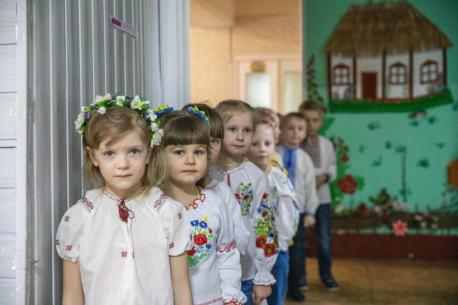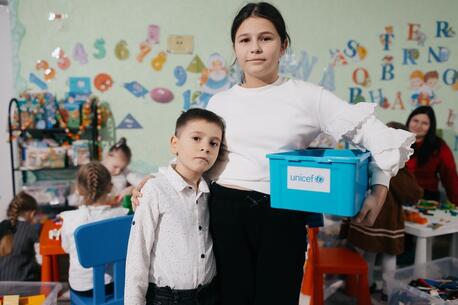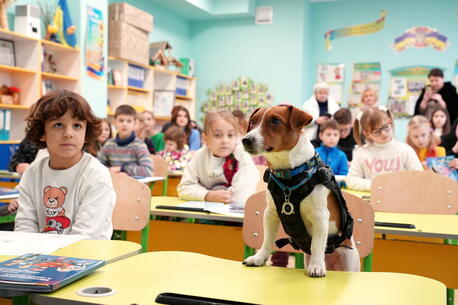
UNICEF in
Ukraine
UNICEF has been supporting vulnerable children and families in Ukraine since 1997 — expanding and extending that work when conflict erupted in the eastern region in 2014, and then deploying a full-on emergency response as war escalated in 2022. UNICEF remains on the ground in Ukraine meeting urgent needs.
Conflict and humanitarian crisis for children in Ukraine
UNICEF's humanitarian work in Ukraine has long focused on meeting critical needs for health care, safe water and nutrition, while also safeguarding children's rights and long term well-being and helping to strengthen critical systems and essential services.
For many years — and well before conflict started in the eastern region in 2014, and sharply escalated in 2022 — UNICEF had been providing critical support to help close gaps in Ukraine's health system, particularly in the areas of childhood immunizations and HIV prevention.
That support ramped up as war intensified across Ukraine. UNICEF rushed emergency supplies into the country — including essential medicines, midwifery kits, surgical kits and other lifesaving supplies to health facilities where women were giving birth in makeshift basement bunkers. Assistance was increased across all major program areas, from water and sanitation to education to child protection.
UNICEF's humanitarian action in Ukraine — and in refugee-hosting countries — continues nonstop alongside partners to meet urgent needs. As in any emergency, top priorities for UNICEF include assisting unaccompanied and separated children and protecting women and girls from gender-based violence and sexual exploitation.
Insecurity and deprivation in Ukraine's eastern region a way of life even before Feb. 24, 2022
The war in Ukraine is a child protection crisis of epic proportions. The rapid exodus in the days and weeks following the Feb. 24, 2022 escalation of conflict dwarfed all other previous refugee crises in terms of scale and speed.
Even before the heavy weapons fire and air strikes on cities and civilian neighborhoods, insecurity and deprivation had become a way of life for families in Ukraine's eastern Donetsk and Luhansk oblasts due to a conflict that started in March 2014.
Humanitarian needs have been particularly acute for those living in the vicinity of the 'contact line' separating government-controlled areas from non-government-controlled areas. The socio-economic and health impacts of the COVID-19 pandemic had only compounded existing hardships.
UNICEF's emergency response teams have been on the ground on both sides of the contact line since 2014, delivering humanitarian assistance to impacted communities. As war escalated, they quickly expanded in number and reach, ramping up emergency operations focusing on the hardest-hit areas.
Having already established relationships with local partners — and a programmatic presence in the country since 1997 — helped UNICEF scale relief operations quickly.
Impact of UNICEF's response to war inside Ukraine
UNICEF's ongoing humanitarian relief efforts have so far (as of Aug. 31, 2023) reached millions of these impacted children and their families.
That impact spans all major programs:
- in health, over 7.3 million children and women in Ukraine have been able to access primary health care in UNICEF-supported facilities and through mobile teams
- close to 5.7 million people have gained access to safe water for drinking and domestic needs
- Nearly 3.7 million children and caregivers have been reached with mental health and psychosocial support services
- in education, with UNICEF's support, nearly 2.5 million children, from pre-preschool on up, have been able to get back to learning, either in a school or in an informal setting
- UNICEF-funded multi-purpose humanitarian cash transfers have helped more than 250,000 families, supporting about 1.1 million people, including over 700,000 children
Helping Ukrainian refugees in host countries
Between Feb. 24, 2023 and the end of May 2022, 7.7 million people in Ukraine had been internally displaced by war and more than 6.4 million people — including nearly two-thirds of all children in Ukraine, at a rate of one child every second — had crossed into Poland, Romania, Moldova, Slovakia, Hungary and other neighboring countries.
By the end of December 2022, 7.9 million Ukrainian refugees had been recorded across Europe. As of September 2023, over 5.8 million — 94 percent of all Ukrainian refugees globally — were still there.
While many have been able to visit Ukraine temporarily, 40 percent have not, due to financial constraints and also fear of losing their legal status in their host countries.
Many Ukrainian refugees in Europe continue to face challenges in terms of social integration and many contend with limited access to health care and housing.
UNICEF continues to work with governments and other local partners in host countries to provide health care, education and other support services to Ukrainian refugees.
Through these efforts, for example, UNICEF has helped over 500,000 refugee women and children access primary health care and over 1.4 million children have received education support, formally or informally, including early learning.
Nearly 1.7 million children and caregivers have been reached with mental health and psychosocial support services, made even more accessible through the 36 Blue Dots, refugee support centers set up along major transit routes.
Messages on preventing violence and exploitation — including human trafficking — and how to access to emergency relief services have reached over 10 million people.
UNICEF reports details of its response and impact for refugee children and families in Belarus, Bulgaria, Czech Republic, Hungary, Moldova, Poland, Romania, Slovakia and many other countries in situation reports posted here.
Help UNICEF continue to save and protect Ukraine's most vulnerable children and families. Ongoing programs remain underfunded. Your tax-deductible contribution can make a difference. Donate today.



